Stem Cell Therapy for Kidney failure in India: Benefits, Risks & Safety
Are you considering stem cell therapy for kidney failure in India but hesitating because you don’t know whether it is safe or not?
We can understand your dilemma.
But you should know that kidney failure cannot stop you from living your life and enjoying your day-to-day activities.
The right treatment at the right time can give you the chance to live a healthy and active life.
Stem cell therapy has extraordinary potential and it can help damaged kidneys heal and reverse chronic kidney diseases (CKD).
But before learning about how stem cell therapy helps in kidney failure, let’s understand how your kidneys work and why they fail.

Key Takeaways
- Stem Cell Therapy Potential: Stem cell therapy can help repair damaged kidneys, reduce inflammation, and potentially reverse chronic kidney disease (CKD).
- Best Applied Early: Therapy shows better outcomes when applied during the early stages (Stage 1 or 2) of CKD, delaying or preventing the need for dialysis or transplant.
- Treatment Process: Mesenchymal Stem Cells (MSCs) regenerate kidney tissue, improve immune function, and slow further kidney damage.
- Cost and Success Rate: In India, each cycle of stem cell therapy costs between $2,000 to $3,000, with a 60-80% success rate, especially in early CKD stages.
- Consideration Factors: The patient’s CKD stage, doctor’s experience, treatment protocol, and success rates must be evaluated before opting for stem cell therapy.
Kidneys are the filter system of your body. They are located at the back of your abdomen.
Your kidneys remove the waste products from your blood and balance your body’s fluids.
Kidneys are also part of your urinary system. Also, they filter fluid from your body. They remove the waste from your body in the form of urine while doing so.
They also help you balance your body’s fluids like water and electrolytes. Electrolytes have important minerals like sodium and potassium.
Your Kidneys are part of the filter system of your body. Your kidneys filter blood and remove the waste products from your blood and thus balance your body’s fluids.
Your kidneys are also part of your urinary system. Your kidneys filter fluid from your body and remove the waste from your body in the form of urine.
Your kidneys also help you balance your body’s fluids like water and electrolytes. Electrolytes have important minerals like sodium and potassium.
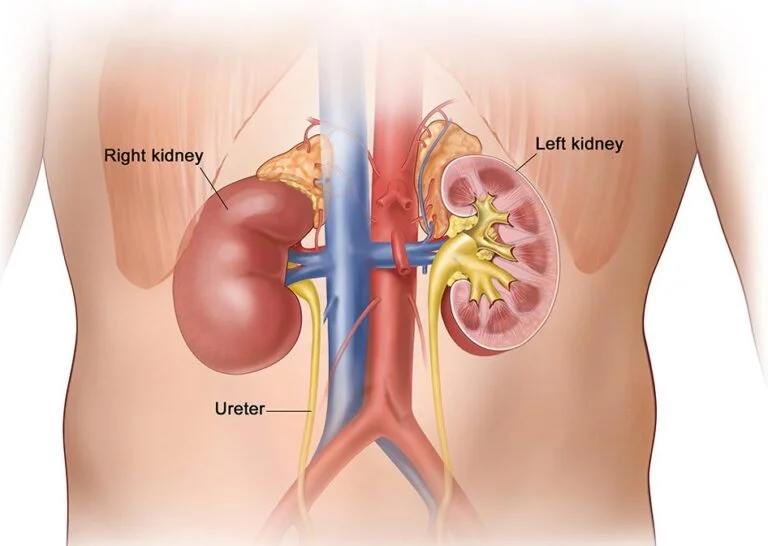
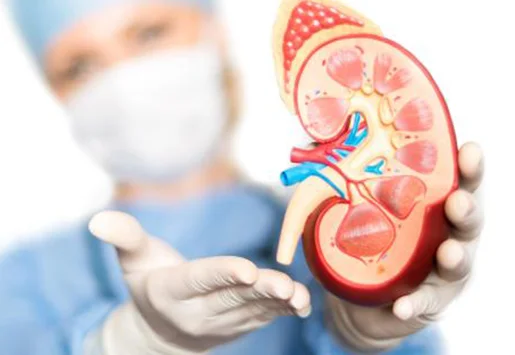
In chronic kidney disease (CKD), your kidneys lose their function gradually. If the CKD reaches advanced levels, your body starts accumulating a huge amount of waste and fluids.
So the advanced stage of CKD can be life-threatening.
If you are in the early stage of CKD you might have a few symptoms and that’s why you may not realize that you have any serious health issues. You may not realize that you have CKD until you reach the advanced stage.
The goal of CKD treatment is to slow down the process of kidney damage by controlling the cause of it.
That is why it is always better to understand the stages of CKD.
What are the stages of Chronic Kidney Disease?
Here are the 5 stages of CKD. These stages range from mild damage in stage 1 to complete kidney failure in stage 5.
The stages are categorized based on how much extra fluid and waste your kidneys can filter out of your blood.
Your kidneys can still filter out waste from your blood in the early stages of kidney disease.
But they need to work harder to get rid of waste and they even may stop working completely as they reach more advanced stages.
Before we begin with the stages of chronic kidney disease, let’s first understand what eGFR is.
eGFR (Estimated Glomerular Filtration Rate) is the test to measure your level of kidney function and determine your stage of kidney disease. The value of eGFR is calculated by your blood creatinine test results, age, body size, and gender.
eGFR tells how much kidney function you have. A Kidney disease gets worse if GFR goes down.
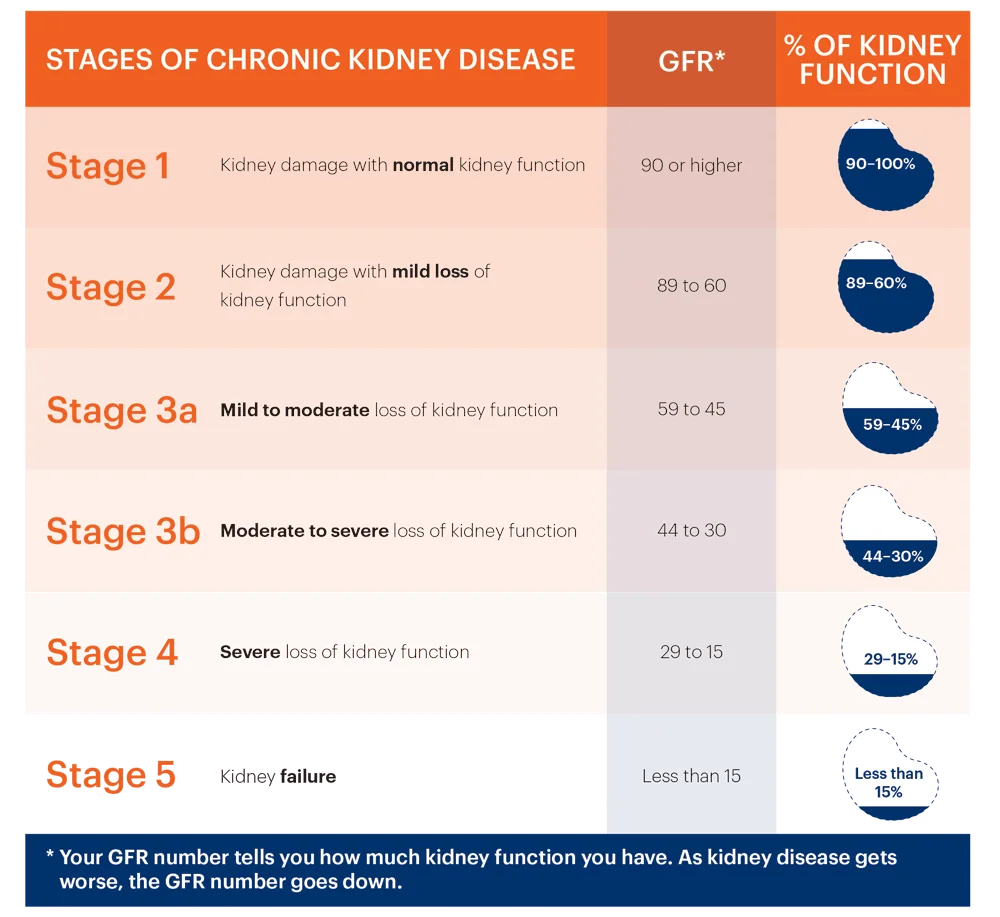
If your eGFR is 90 or above, it signifies that you are in Stage 1 CKD and you have suffered a minimal amount of kidney damage.
Specifically, the eGFR of 90 or more means that your kidneys are functioning properly but other test results suggest you have kidney disease.
Such signs may include the presence of protein in your urine (pee) or actual physical harm of your kidneys.
If your eGFR ranges from 60 to 89, your kidney disease stage is two.
In this stage, although the kidneys are healthy and functioning well, you will begin to experience some of the symptoms of a mild level of kidney damage.
The symptoms of this stage are almost the same as the symptoms of the first stage but are characterized by higher severity.
The treatment of stage 2 chronic kidney disease is not very challenging at all because this stage is characterized by little harm to the kidney and can be healed quickly.
If you have an eGFR between 30 and 59, you have reached Stage 3 CKD. At this stage, your kidneys are damaged or they are not working as they should.
That is why, stage 3 chronic kidney disease treatment becomes complicated.
You might start observing symptoms like:
- Swelling in hands and feet
- Regular Back pain
- Frequent or less Urination (peeing) than normal
In Stage 3, health complications start showing up as waste builds up in your body and your kidneys are not working well. Some of these complications can be:
- High blood pressure
- Anaemia (a condition in which red blood cells are deficient)
- Bone related disease
At stage 3, you have to visit a nephrologist (kidney doctor). After analyzing your condition doctor will make a treatment plan that is right for you and tell you how often you will need to have your kidneys checked.
Apart from consulting with a nephrologist, you should also meet with a dietitian, who will help you follow a healthy diet.
Also, regularly check your blood pressure and diabetes and get regular medicine.
When you have an eGFR between 15 and 29, you have reached the stage 4 CKD.
In this stage, your kidneys are moderately or severely damaged.
You need to remember that stage 4 of CKD is a severe condition and it is the last stage before kidney failure.
Your hands and feet may swell. You may have back pain and you may you may urinate frequently at this stage.
Your health worsens further as waste builds up in your body. You may also have health issues like High blood pressure, anaemia, and Bone-related disease.
Here are some of the things you should do at this stage:
- Visit a nephrologist regularly. You should visit the nephrologist every three months.
The nephrologist will guide you and advise you on the treatment plan that is most appropriate for you. Nephrologists may also suggest specialized blood pressure medicines like ACE inhibitors and ARBs (Angiotensin Receptor Blockers) depending on your vital parameters and comorbidities.
- Consult a dietitian, who will suggest a healthy diet plan.
Apart from that, you should ask your nephrologist about how to prepare for kidney failure, you need to start dialysis and even prepare for a kidney transplant once your kidney function starts deteriorating beyond a point.
Your doctors prescribe dialysis to remove waste products and excess fluid from your blood.
They may suggest a kidney transplant, too. A transplant is a surgical procedure in which a healthy kidney from a living or deceased donor is taken and placed into your body. Learn more about kidney transplants.
If you have an eGFR of less than 15, it means you have Stage 5 CKD. Your kidneys are getting very close to failure or have entirely failed.
If your kidneys fail, waste builds up in your blood, and your health day by day getting more deteriorating.
Symptoms of kidney failure were:
- Itching
- Muscle cramps
- Feeling sick and throwing up
- Not feeling hungry
- Swelling in your hands and feet
- Back pain
- Frequent or less urination (peeing)
- Getting trouble breathing
- Sleeplessness
- Anxiety
Once your kidneys have failed, you have left two traditional treatment options, which your doctor will suggest.
- Regular Dialysis
- Kidney transplantation
How can you prevent kidney disease and even slow down the progression of your kidney disease?
Ways that help you to prevent and slow down the kidney damage are as follows:
What are the causes of kidney failure?
Causes and conditions that cause chronic kidney disease (CKD) include:
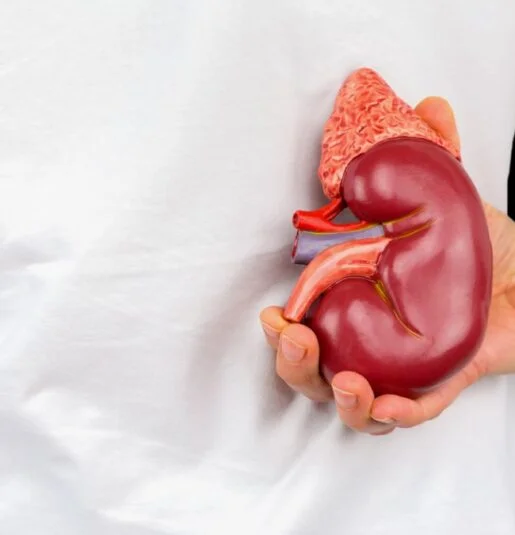
Some of the signs and symptoms of kidney failure depending upon how severe the kidney’s condition are as follows:
The doctors may also perform the following to identify kidney failure: Let’s check them:
A urinalysis is a test that examines your urine to diagnose and treat a variety of diseases, including UTI, diabetes, inflammation, blood in the urine at microscopic levels, and kidney disease.
A kidney ultrasound is a safe diagnostic procedure that does not require a needle, and the results are in the form of images that are used to determine the size, shape and position of the kidneys. It is done to check blockages in the urinary system, kidney stones, cysts, or any abnormal growth in the renal area.
In this scan, a combination of multiple X-ray images is taken from different angles. It provides a clear picture of the kidneys.
Magnetic Resonance Imaging (MRI) is a form of imaging that offers detailed images of your kidneys in 3-D. It is mostly used to determine if you have a tumor in your kidney.
In this test, blood cultures are used to detect bacteria or fungi that may be circulating in the blood. Once the infection is confirmed, blood and urine cultures may reveal the specific bacteria causing it. Based on it, target antibiotic therapy will be accomplished.
In this procedure, the doctors will use a needle to take a small sample of your kidney tissue for biopsy (to allow them to analyze it) . They may take the sample in two ways:
- Percutaneous (through the skin) biopsy,
- Open biopsy(during surgery)
Stem Cell Therapy for Chronic Kidney Disease
Knowing the stages of CKD is essential for you because when you know them and see the symptoms, you will reach out to a doctor immediately which will reduce the risk of further kidney damage.
You can use stem cell therapy at the early stages of kidney disease to reduce all sorts of risks.
But If you or your dear ones are suffering from end-stage kidney disease, you will have many difficulties in terms of your health.
The only solution you have is to undergo dialysis for the rest of your life or opt for a kidney transplant. Both dialysis and kidney transplant have their risks.
Also, people usually undergo 3 dialysis sessions per week and each of these sessions takes 2-4 hours. Dialysis may have many side effects such as vomiting, nausea, muscle cramps, itching, anxiety, and low blood pressure. In short, it costs you both time and money.
On the other hand, kidney transplant has its share of pros and cons. Some major cons of kidney transplants are surgical risks like bleeding, infections, and immunity-suppressing medicines. Additionally, you may need more surgeries if there are any other issues.
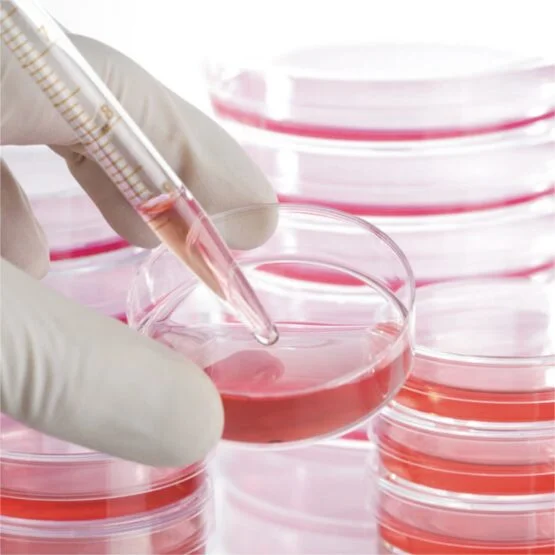
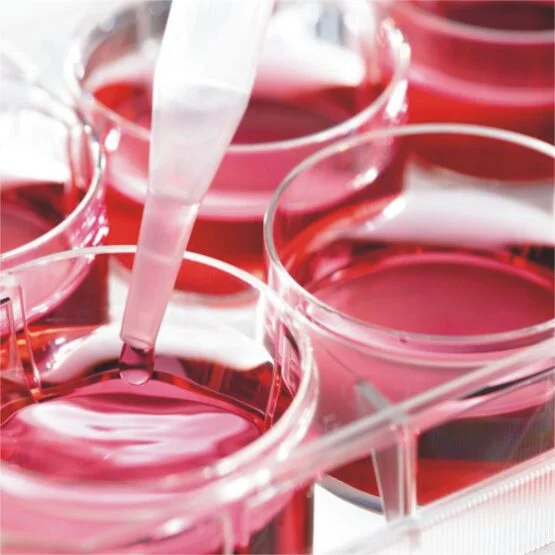
What is Stem Cell?
Stem cells are the cells from which all other cells of your body like blood cells, brain cells, heart muscle cells, bone cells, and skin cells are generated. They work like your body’s basic building blocks.
The first stem cell of your body forms when the male sperm and female egg combine. This single cell creates more stem cells and slowly these stem cells turn into specialized cells. To know more about stem cells check our article on it.
How does Stem Cell work for kidney damage?
Researchers and scientists at Harvard Stem Cell Institute have recently discovered mesenchymal cells, which are a type of stem cells that have the power to heal the kidneys.
The specialists can transplant these stem cells into your body to boost the healing and regeneration of your damaged kidney tissues and treat kidney diseases. It will also lower the inflammation.
Check this video for more insights on how stem cell works.
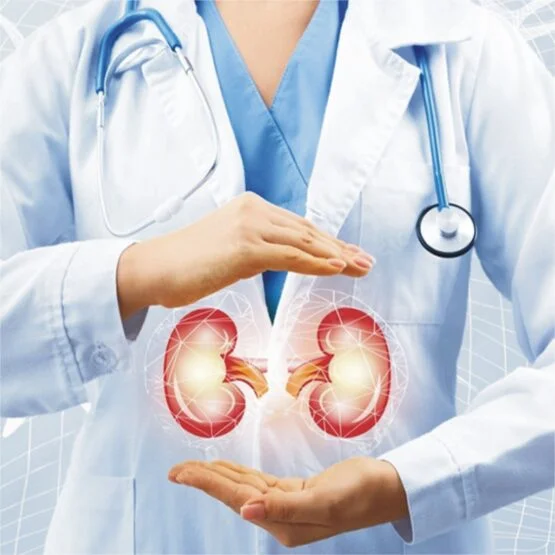
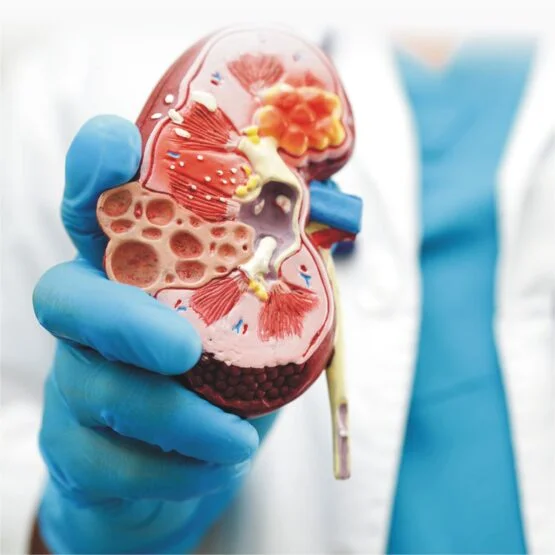
The Process
When doctors use stem cells for kidney disease, they aim to reduce inflammation by improving your immune system. It also focuses on replacing the damaged kidney cells with the new ones which helps your kidney to function properly and filter your body waste well.
Mesenchymal Stem Cell (MSC) transplant is considered the most advanced stem cell transplant. These stem cells produce substances that help blood cell formation in labs.
Also, MSC can transform itself into kidney cells and cells that create the kidney structures. These cells reduce inflammation in the kidneys prevent cell death in your kidney and boost the kidneys’ overall function.
Benefits of Stem Cell Therapy for CKD
Here are some of the benefits of stem cell therapy for kidney diseases:
- Stem cells have anti-inflammatory properties that will reduce inflammation in your body
- Reduced inflammation means your body will be able to heal faster
- Stem cell therapy is safe.
- Stem cell therapy can slow down the damage, created by CKD. it can prevent further damage to your kidneys and it can also reverse kidney damage.
- Mesenchymal stem cells (MSC) and endothelial progenitor cells (EPC) have the power to regenerate damaged tissues and this regenerative power can help restore your kidney function.

Regulatory Approval Status of Stem Cell Therapy for CKD
Stem cell treatment is under research now. However, there is evidence that indicates the effectiveness of this procedure.
Factors to consider before deciding on Stem Cell Therapy for Kidney Failure in India
Here are some of the factors you should consider before opting for stem cell therapy for chronic kidney disease.
The success of your treatment will completely depend on the stage of kidney damage. You can expect positive results if you are in the early stages. But in Stages 4 and 5 the stemcell therapy will only be able to delay the need for kidney transplant.
You should also know that there is no standard protocol. The protocol varies from doctor to doctor and that’s why the outcome of the treatment also varies.
When you approach a doctor, make sure you understand the protocol or the procedure they follow for the treatment. You should also know the other prevailing protocols.
If you can find someone who can help you evaluate the protocols and guide you appropriately, you will be better equipped.
You also need to check the experience of the doctor you are approaching for stem cell therapy.
As said above, the protocol or the procedure varies from doctor to doctor and this affects the outcome of the treatment.
That is why, you need to choose a doctor with a proven track record and well-defined protocol. The support therapies they use also boost the outcome of the treatment.
In short, you should opt for a doctor who has consistently delivered positive results in stem cell therapy mostly because this shows their expertise and the reliability of their methods.
You should also get an insight into the success rate of your stage of kidney disease. As said above, in the early stages of CKD you can expect a positive result. But if you are in the advanced stages you should consider before opting for stem cell therapy, as the success rate is really low.
This means all your treatment efforts may go in vain.

Cost of StemCell therapy for CKD in India
You may be concerned about the affordability of stem cell therapy for CKD in India. That is an obvious concern most people have.
India’s stem cell therapy cost is around 2000 to 3000 USD (160,000 INR to 240,000) per cycle and it will completely depend on the number of cycles you need.
The factors that will impact the cost are the patient’s stage of kidney disease, the doctor’s fees, and the protocol or procedure they follow.
Success rates of stem cell therapy for CKD in India
The success rate of stem cell therapy in India is 60 to 80 percent. At the same time, you should remember that early stages of kidney disease have much higher chances of success than advanced stages.
What is the conventional treatment for CKD?
In traditional treatment, the doctor will control the signs and symptoms which is caused by kidney disease, reduce complications, and prescribe you the medication that slows the progression of the disease. If your kidneys become severely damaged, you might need dialysis and transplantation.
The doctor will try to control your kidney disease-related complications to make you more comfortable. They might give you
- High blood pressure medications
- Medications to relieve swelling
- Medications to treat anaemia
- Medicines to lower cholesterol levels
- Medications to protect your bones
- A lower protein diet to minimize waste products in your blood
If your kidneys’ function has worsened and they no longer filter waste and fluid from your system, it indicates that you are suffering from complete kidney failure or you have end-stage kidney disease. At that point, you need dialysis or a kidney transplant.
Your doctors will prescribe dialysis to remove waste products and extra fluid from your blood. This is required when your kidneys can no longer do this function.
Your doctor will prescribe either of the two types of dialysis.
In hemodialysis, you will need a machine to filter your body waste and excess fluids from your blood.
In peritoneal dialysis, a thin tube is inserted into your abdomen to fill your abdominal cavity with a dialysis solution that absorbs waste and excess fluids.
After a time, the dialysis solution drains from your body, carrying the waste with it.
In a kidney transplant, doctors will surgically place a healthy kidney from a donor into your body. You can get these transplanted kidneys can come from deceased or living donors.
After a transplant, you’ll need to take medications for the rest of your life to keep your body from rejecting the new organ. You don’t need to be on dialysis to have a kidney transplant.
What are other alternatives for CKD treatment in India
Homeopathy and Ayurveda are two alternatives for CKD treatment in India and other kidney-related diseases.
Like Ayurveda, homeopathy medicines target the root cause of diseases. There are medicines for both early and later stages of kidney disease.
Homeopathy is another natural treatment option that has no side effects. The homeopathic doctor will check your signs and symptoms and accordingly prescribe the medicine.
With the help of a team of specialists, you can combine homeopathy with allopathy to get maximum outcomes.
Ayurveda focuses on identifying and correcting the root causes of ailments. You can have these herbal medications along with some lifestyle changes.
Using these natural medicines gives you sustainable results but you get them gradually because Ayurveda focuses more on treating the root cause instead of giving instant relief.
To get the best results you can use Ayurvedic medicines for Chronic Kidney Disease (CKD) at the early stage of your kidney disease.
When you use them in stages 1 and 2, it is possible to achieve a permanent recovery from the disease. But don’t forget to make lifestyle and dietary changes.
You can consult a team of experts and combine Ayurvedic treatment with allopathic medicines. This combination slowly reduces the doses of the latter.
As these medicines are herb-based, they don’t have any side effects.
However, finding doctors who know both disciplines may be challenging for you. In that case, MedicoExperts can help you find the right team of doctors.
Case Study
There was a young 29-year-old engineer from Kolkata who discovered us and dropped the message through the website. His creatinine level was increased from 3 to 8.2 in just a year. Moreover, he also had a COVID-19 infection which eventually resulted in mild fibrosis in the lungs. When he contacted us, he was undergoing dialysis thrice a week.
The young engineer, Mr Saha, belongs to a decent, well-to-do family with Parents and a young sister. He was planning to get married to his committed girlfriend. Both were in a relationship right from their college days. The happy-to-go couple was full of dreams of marriage, a honeymoon, a new house, and doing something significant for the family.
All the dreams and plans started shattering when Mr Saha started showing the symptoms of kidney disease. The condition started worsening when the COVID-19 infection severely impacted him, and he needed to be hospitalised. There were complications, and he was shifted to oxygen support for ten days. He eventually won the battle of COVID-19 but with a mild impact on his lungs. There was happiness in the family after winning the fight against COVID-19, but it didn’t last much. In the whole process, his creatinine level has increased from 3 to 8.2.
Doctors recommended him for a kidney/renal transplant. However, a renal transplant is not a big challenge when you have a donor. His girlfriend was even willing to donate the organ for him.
However, 29 years is too young an age for a kidney transplant. Even if Mr Saha has a donor today, what would happen if there were a repetitive need after 15-20 years? He might not even get the donor. So, deferring the transplant was best for him.
MedicoExperts guided him to one of its empanelled stem cell experts who had earlier dealt with many CKD (chronic kidney disorder) cases and generated commendable results.
He underwent four cycles of stem cell therapy along with supportive therapies.
His creatine levels reduced from 8.3 (at the time of admission) to 5.1 within ten days of discharge from the hospital. Moreover, the creatine levels reduced from 5.1 to 3 in the next six weeks.
At the time of writing this article, the couple is married. The frequency of health updates has reduced drastically. As per the last update, Mr Saha’s creatine level was 1.9. He is on regular kidney medication.
As per the treating stem cell expert, he would not require any significant treatment/procedure at least for ten years if he can manage his lifestyle.
Takeaway
It is important for you to understand that stem cell therapy will work best in the early stages of CKD. That’s why you should approach a stem cell specialist in the 1st or 2nd stages.
If you are in the advanced stages of CKD, your goal should be to buy more time and get the transplant done later.
Another important point you should remember is that you need to choose an experienced doctor and understand the protocol they follow thoroughly. You also take the help of Medicoexperts if you are confused about protocols and doctors.
To get further insight or assistance on stem cell therapy for kidney failure, reach out to our team.

Frequently Asked Questions (FAQs)
1. Does stem cell therapy for CKD patients work?
Yes, the stem cell therapy works for kidney diseases.
However, the additional concern that you might be having is its effectiveness.
The effectiveness of stemcell therapy varies based on which stage of kidney disease you are in.
Stemcell therapy is typically more effective in the early stages of kidney diseases. But if you are at end-stage kidney failure, you will be only able to buy time until you get a kidney transplant.
2. What is the latest treatment for Chronic Kidney Disease?
Mesenchymal stem cell transplant is the latest treatment for CKD.
3. Which of the following can damage the kidneys over time and cause chronic kidney disease?
Diabetes and high blood pressure can damage your kidneys and cause CKD.
4. How to treat Chronic Kidney Disease?
Stem cell therapy can be the best way to speed up your recovery process if you are in the early stages of CKD. Stem cell treatment for kidney failure works very well in these stages
But you need to undergo dialysis and you may even need a transplant if you are in the end stage.
5. How to prevent Chronic Kidney Disease?
You can prevent chronic kidney disease by:
- Opting for a healthy diet
- Managing your blood sugar levels
- Managing your blood pressure
- Managing your cholesterol levels
- Being active
6. What is acute-on-chronic-kidney-disease treatment?
Acute or chronic kidney disease or sudden worsening of CKD happens when your body doesn’t have enough fluid because of a disease like respiratory infection, urinary tract infection, or stomach infection.
You should completely stop using medicines that can harm your kidneys further in this condition. You should also avoid common over-the-counter drugs like NSAIDs.
7. Can stem cell therapy cure kidney disease?
Scientists are still researching the cure for kidney disease. However, researchers have seen promising results with mesenchymal stem cell transplants.
Recommended Articles For You
https://www.kidneyfund.org/all-about-kidneys/stages-kidney-disease
https://ukkidney.org/health-professionals/information-resources/uk-eckd-guide/ckd-stages
https://www.kidneyfund.org/all-about-kidneys/stages-kidney-disease/stage-4-chronic-kidney-disease-ckd s_src=website&s_subsrc=Stages%20of%20kidney%20disease%20%7C%20Learn%20more%20about%20stage%204%20chronic%20kidney%20disease%20%28CKD%29
https://www.pennmedicine.org/for-patients-and-visitors/patient-information/conditions-treated-a-to-z/end-stage-kidney-disease
https://www.nhs.uk/conditions/dialysis/side-effects/
https://hsci.harvard.edu/kidney-disease-0
https://www.ajmc.com/view/study-finds-autologous-stem-cell-transplantation-safe-effective-in-patients-with-multiple-myeloma-chronic-kidney-disease
https://pubmed.ncbi.nlm.nih.gov/27721835/#:~:text=Multiple%20preclinical%20studies%20have%20demonstrated,of%20paracrine%20factors%20and%20microvesicles.
https://www.researchgate.net/publication/353658853_Efficacy_of_Renal_Precursor_Stem_Cells_in_Management_of_Chronic_Kidney_Disease_A_cohort_study
Recommendations To Understand Different Treatments
10 Benefits of Stem cell therapy for CKD over kidney transplant
Are you looking for an alternative to kidney transplant? Stem cell therapy for CKD is one of the best alternative and affordable treatment over kidney transplant……Read More
Kidney cancer is the ninth common cancer that occurs in men and the fourteenth common cancer in women according to WCRF. Detection of cancer itself is a matter of…..Read More
Medically Reviewed By MedicoExperts Editorial & Clinically Review Board On 25 May 2024

Author Bio:
Dr. Ashita Nandgaonkar – BHMS, MS in psychological counseling
Dr. Ashita Nandgaonkar is a highly esteemed homeopathic doctor with a passion for holistic healing and patient-centered care. Dr. Nandgaonkar remains dedicated to raising awareness about the benefits of homeopathy and promoting its integration into mainstream healthcare. Her mission is to empower individuals on their journey to health and wellness, embracing the holistic approach that homeopathy offers. She has a special interest in researching Homeopathic solutions for diseases that are difficult to treat with conventional medicines and therapies.
Content Medically Reviewed By MedicoExperts Editorial & Clinically Review Board

MedicoExperts is a Global virtual hospital which is established to offer quality healthcare services at affordable pricing without compromising the success rates of the treatment.
MedicoExperts is having a network of highly experienced super specialist doctors and well equipped hospitals across the globe and offering second opinion through online video consultation and surgical interventions through its empanelled super specialist doctors at its network hospitals in 17 countries from 3 continents.
By the virtue of its approach and model, MedicoExperts is successfully achieve to deliver
- Latest and most advanced treatments with success rates of international benchmarks.
- Multiple cost options depending upon the hospital facilities, with the same doctor.
- Treatment option in multiple cities/state/countries.
- Trust and peace of mind.
Most suitable for patients who are looking for:-
- Planned Surgeries and treatment from most experienced doctors and at multiple cost options as per hospital facilities with best possible outcomes.
- Second Opinion from expert doctors.
- Complex cases involving multi specialities
- International patients looking for treatment from Indian doctors




